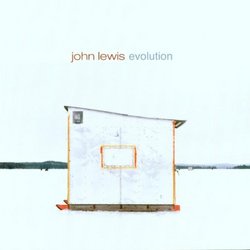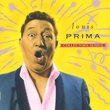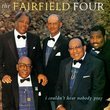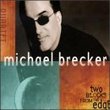| All Artists: John Lewis Title: Evolution Members Wishing: 0 Total Copies: 0 Label: Warner Music France Original Release Date: 9/14/1999 Release Date: 9/14/1999 Album Type: Import Genres: Jazz, Pop Style: Number of Discs: 1 SwapaCD Credits: 1 UPCs: 075678321122, 007567832112 |
Search - John Lewis :: Evolution
 | John Lewis Evolution Genres: Jazz, Pop
For nearly 60 years, pianist John Lewis has co-led the Modern Jazz Quartet and successfully fused Bach, bop, and the blues into his own brilliant musical conception. He's recorded only twice as a solo pianist, which makes ... more » |
Larger Image |
CD DetailsSynopsis
Amazon.com For nearly 60 years, pianist John Lewis has co-led the Modern Jazz Quartet and successfully fused Bach, bop, and the blues into his own brilliant musical conception. He's recorded only twice as a solo pianist, which makes this offering all the more special. Alone at the keyboard, the New Mexico-raised Lewis displays the kind of spare and swinging pianism that recalls the "storytelling" style that made Count Basie and saxophonist Lester Young famous. Lewis's sly, rollicking version of "Sweet Georgia Brown" is a superb example of how to swing and embellish without wasting notes, as are his takes on the standards, "I'll Remember April," "Willow Weep for Me," "Cherokee," and "Don't Blame Me." Lewis's invigorating improvisation breathes new life into his own compositions. "Afternoon in Paris" is blessed with an engaging lyrical melody. "Two Degrees East, Three Degrees West" rings with the cool hues of the blues, while "At the Horse Show" is an impromptu, fleet-fingered workout. Lewis's "Django" is moving elegy to guitarist Django Reinhardt, rendered in a mournful, Ravelian mood, and "For Ellington" is performed in the same saintly and sanctified aural image of "Come Sunday" and "Heaven" by this underrated master of African-American piano. --Eugene Holley Jr. Similarly Requested CDs
|
CD ReviewsLyrical Crystals Samuel Chell | Kenosha,, WI United States | 03/28/2003 (5 out of 5 stars) "I'm not sure what's more amazing-John Lewis' unique talent or the relative disregard of him as a player. I recall coming to a recognition of his deceptive but exceptional pianism only after hearing him years ago at a Newport Jazz Festival featuring eight major piano soloists on the same bill. Lewis blew away the field.A minimalist, John could make a Count Basie or Erik Satie sound florid by comparison. No musician has been more secure in his musical values, refusing to alter as much as the sound of a single note for the sake of impressing his audience, yet his music is utterly accessible, transparent, disarming.Play the album once; be charmed or unimpressed by it. But don't start counting until the second listen. Try to find an unnecessary note (in either hand), a cliché, a passage played for effect or mere mood. Each Lewis construction is a model of efficiency, economy and ingenuity. Most pianists see the piano as a voice, for Lewis it's a tool. The improvisations express less a mood or inspiration than an achievement-a design that's as playful as it is satisfying-and as appealing to the child in us as the sophisticate.As if to remind us that virtuosity isn't of itself a virtue, Lewis includes several familiar bebop anthems, display pieces traditionally taken at a fast and furious tempo-"Cherokee," "I'll Remember April," "Sweet Georgia Brown"-and extracts the vital essences of each. I expected to be unmoved by "Django", as often as I've heard it played by the MJQ, but Lewis reveals yet new facets of this sparkling diamond and of his other originals.Understanding the accomplishment of this music probably requires little effort, but for a start lisen to the control of the pedals. Nothing is blurred or lost, even with the quickly exchanged chords in the bass and treble registers. Each note counts, and every note is visible to the naked ear. In fact individual notes assume such autonomous importance that the distinctions between melody, harmony, rhythm are all but forgotten. If there's an equivalent in jazz to the classic balance to be discovered in Jane Austen's novels, Shakespeare's sonnets, or Japanese haikus and gardens, it's John Lewis' music.," Possibly over-analytical? William A. Adams | Bainbridge Island, WA USA | 02/22/2001 (4 out of 5 stars) "I love MJQ. This is not MJQ. I don't know what I was expecting. Lewis is a grade A, for sure. His strength, to my mind is analysis. He shows me aspects of a song I thought I knew (like Cherokee) which I never have seen before. But it is a solo album and taking the performance as a whole,my thought is, he's not Keith Jarrett, he's not Marcus Roberts. The performance seems sometimes almost too analytical and because of that, a bit self-conscious. Worth owning and enjoying and learning from." Fantastic. What a genius. Cr Garcia | san diego, ca | 02/28/2007 (5 out of 5 stars) "A friend showed me this album's version of Django without telling me who it was. My immediate reaction was to guess that it was Keith Jarrett, but with extra restraint and focus. I was shocked to hear that it was John Lewis; I had underestimated him.
I rushed out to buy this album and found that the rest was just as good. The tunes are well chosen and extremely well played. The improvisation is melodic and profound. If you like Jarrett or solo piano or just beautiful jazz, BUY THIS ALBUM." |

 Track Listings (11) - Disc #1
Track Listings (11) - Disc #1



